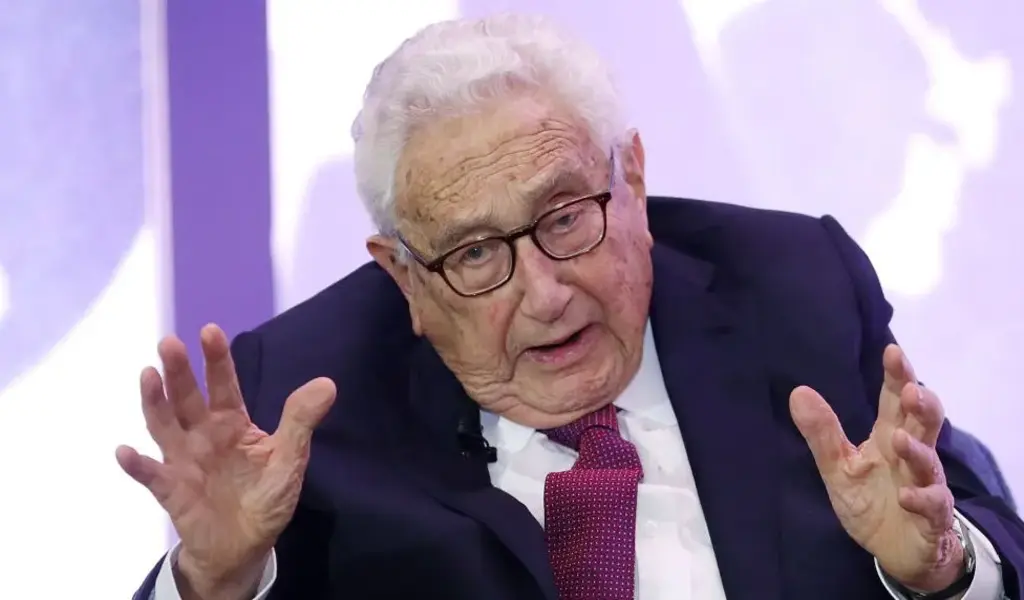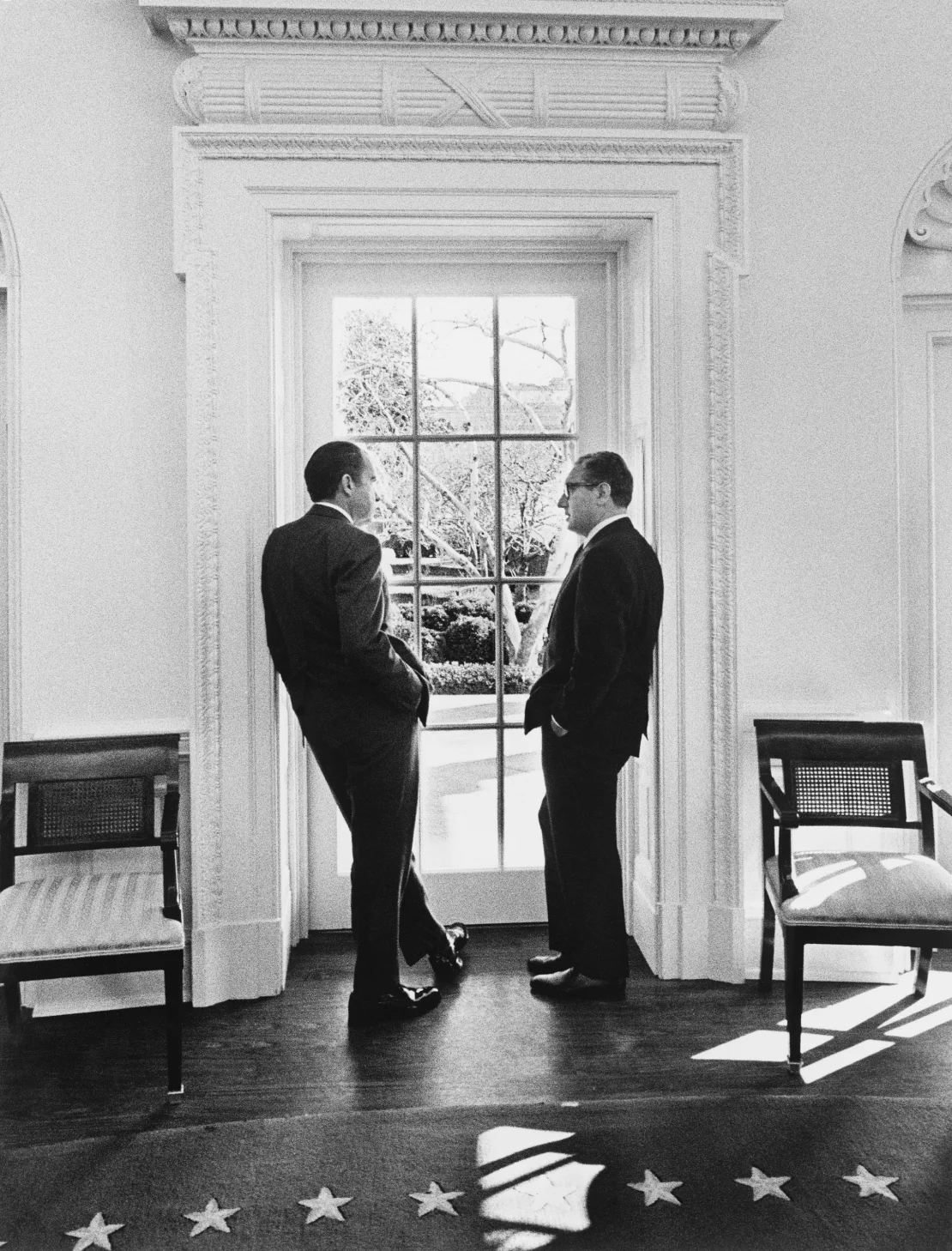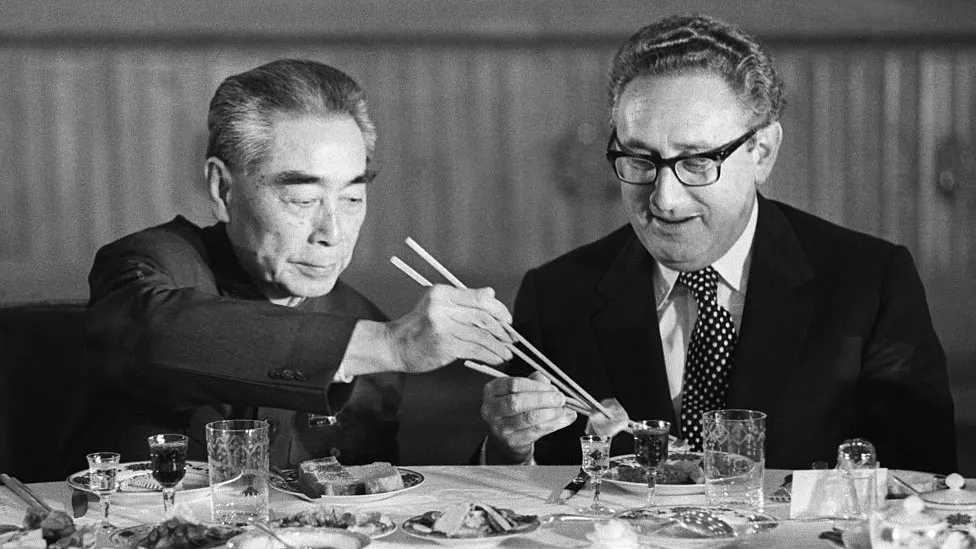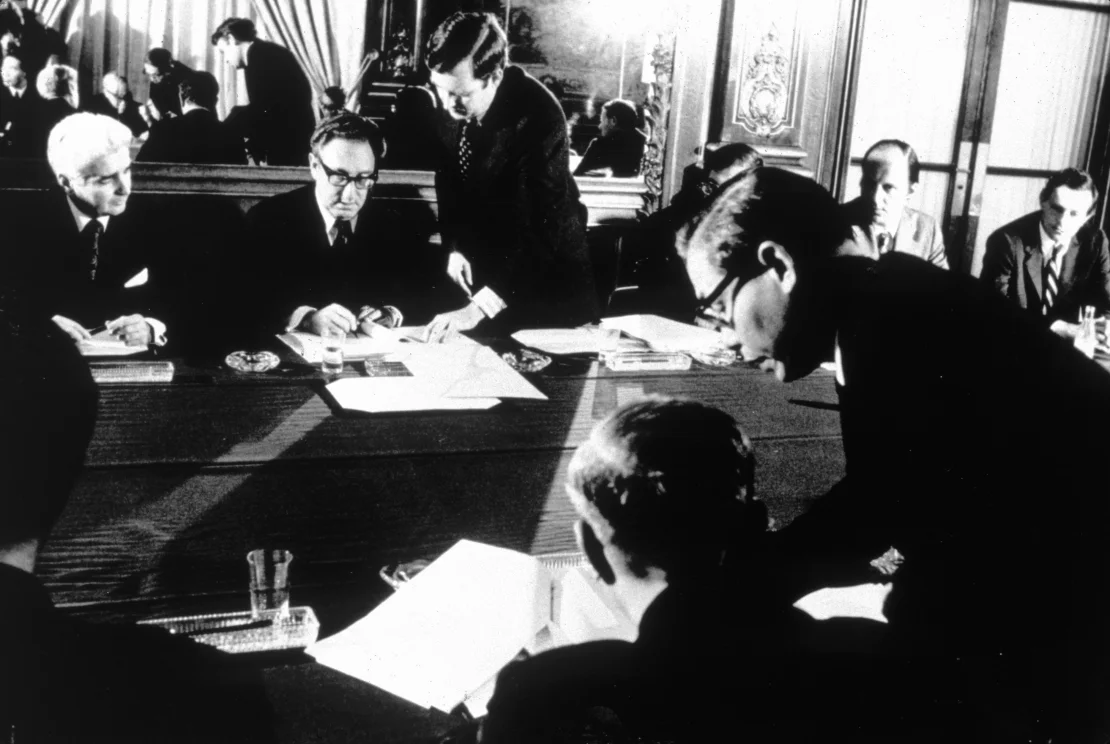(CTN News) – Henry Kissinger, a 100-year-old diplomatic giant whose tenures as two presidents’ national security advisor and secretary of state forever altered American foreign policy and garnered him a contentious Nobel Peace Prize, passed away on Wednesday.
A statement from Kissinger Associates Inc., his geopolitical consulting firm, stated that Henry Kissinger passed away at his home in Connecticut. The circumstances were not mentioned.
His burial would take place at a private family ceremony, with a public memorial service in New York City to follow at a later date, according to the announcement.
Even after turning 100 years old, Kissinger kept busy, going to White House meetings, writing a book on leadership styles, and giving testimony to a Senate committee over North Korea’s nuclear danger. He met with Chinese President Xi Jinping during an unexpected trip to Beijing in July 2023.
While serving as national security adviser and secretary of state under Republican President Richard Nixon in the 1970s, he was instrumental in many of the decade’s game-changing global events, which occurred during the Cold War.
The diplomatic opening between the United States and China, the historic weapons control talks between the United States and the Soviet Union, strengthened relations between Israel and its Arab neighbors, and the Paris Peace Accords with North Vietnam were all outcomes of the work of the Jewish immigrant from Germany.
After Nixon resigned in 1974 due to the Watergate crisis, Henry Kissinger’s influence as the principal strategist of American foreign policy began to decline. Nonetheless, he remained a formidable diplomatic force as secretary of state under President Gerald Ford, who succeeded Nixon, and he never shied away from expressing his strong beliefs.
Some saw Kissinger as a war criminal due to his backing of anti-communist dictatorships, particularly in Latin America, while others praised his intelligence and extensive expertise. As he grew older, other countries tried to stop him from traveling by arresting or interrogating him about previous American foreign policy.
His 1973 Peace Prize was one of the most contentious ever; he and North Vietnamese leader Le Duc Tho shared the honor, but Duc Tho later declined. Concerns regarding the covert American bombing of Cambodia led to the resignation of two Nobel committee members who had been involved in the selection process.
Ford referred to Henry Kissinger as a “super secretary of state” and made note of his snark and confidence, traits that detractors would certainly characterize as egotism and paranoia. So even Ford conceded, “Henry in his mind never made a mistake.”
Just before he passed away in 2006, Ford made the statement, “He had the thinnest skin of any public figure I ever knew,” in retrospect.
Henry Kissinger gave off the impression of being both a stuffy academic and a ladies’ man while he was single, squirting starlets around New York and Washington with his gravelly, German-accented voice and glum countenance. The supreme aphrodisiac, according to him, was power.
Kissinger was outspoken on policy but kept his private life under wraps, though he did once tell a journalist that he fancied himself a cowboy hero who rode out into the sunset by himself.
Heinz Alfred Henry Kissinger emigrated to America in 1938, just before the Nazi persecution of Jews in Europe began, after been born on May 27, 1923, in Furth, Germany.
Kissinger changed his given name to Henry after becoming a naturalized American citizen in 1943. He served in the United States Army in Europe during WWII and received a scholarship to attend Harvard University, where he earned a master’s and a doctorate in 1952 and 1954, respectively. His subsequent seventeen years were spent teaching at Harvard.
In 1967, for example, Henry Kissinger mediated between the Vietnamese people and the State Department, one of many government departments for which he worked as a consultant throughout that time. He relayed intelligence regarding peace talks to Nixon’s camp through his links with the Johnson administration.
Nixon appointed Kissinger to the position of national security adviser after his campaign promise to terminate the Vietnam War contributed to his 1968 presidential victory.
Over the course of the brutal “Vietnamization” process, which involved transferring the war’s burden from the 500,000-troop U.S. forces to the South Vietnamese, the United States dropped a flurry of bombs on North Vietnam, mined its harbors, and bombed Cambodia.
The Paris Peace Accords, which were concluded in January 1973, were merely a precursor to the ultimate Communist conquest of the South two years later, notwithstanding Kissinger’s 1972 declaration that “peace is at hand” in Vietnam.
With his appointment as secretary of state in 1973, Henry Kissinger gained unchecked power in international affairs and continued to serve as national security adviser.
As hostilities between Israel and the Arab world escalated, Kissinger embarked on his first “shuttle” expedition, an example of the intensely personal and high-pressure diplomacy that would later make him renowned.
Kissinger was able to help establish a permanent disengagement deal between Syria and Israel in the Golan Heights, which are currently under Israeli occupation, during his thirty-two days spent traveling between Damascus and Jerusalem.
Two journeys were undertaken by Kissinger to China, including a clandestine one to meet with Premier Zhou Enlai, as part of his effort to reduce Soviet influence by reaching out to China, its primary communist adversary. As a consequence, Nixon and Chairman Mao Zedong had their historic summit in Beijing, and the two nations’ relations were formally formalized.
In an interview with Reuters, Winston Lord—a former U.S. ambassador to China and Kissinger’s special assistant—praised his former employer, calling him a “tireless advocate for peace,” and said, “America has lost a towering champion for the national interest.”
As secretary of state when Gerald Ford assumed office in the summer of 1974, Kissinger was unaffected by the Watergate controversy that led to Nixon’s resignation. He was not involved in the cover-up. However, in an attempt to include different perspectives on foreign policy, Ford did succeed him as national security adviser.
In the latter half of that year, Kissinger accompanied Ford to Soviet Vladivostok, where the president met with Soviet leader Leonid Brezhnev and reached an agreement on the fundamentals of a strategic disarmament agreement. The accord was the culmination of Kissinger’s groundbreaking detente efforts, which lowered tensions between the United States and the Soviet Union.
To be sure, Henry Kissinger could only go so far in his diplomatic efforts. His failure to secure a second phase of disengagement from the Sinai by Egypt and Israel in 1975 was a point of criticism.
Also, Nixon and Kissinger took a lot of heat for seemingly favoring Pakistan during the 1971 India-Pakistan War. A comment that Kissinger subsequently admitted he regretted was his use of the insult “bastards” to describe the Indians.
Similar to Nixon, he was concerned about the propagation of left-wing ideologies throughout the Western Hemisphere. As a result of his activities, many Latin Americans developed a profound mistrust of Washington for many years.
In 1970, he conspired with the CIA to destabilize and depose Salvador Allende, the democratically elected Marxist president of Chile, while in a 1976 document following Argentina’s brutal coup, he advocated for the encouragement of military rulers.
In 1976, when Ford was defeated by Democratic candidate Jimmy Carter, Henry Kissinger’s tenure in the executive suites of government authority was essentially finished. Ronald Reagan, the incoming Republican president, severed ties with Henry Kissinger because, in Reagan’s view, the latter was too liberal for his conservative base.
Following his departure from government service, Kissinger established a New York-based, ultra-powerful consulting firm that catered to the global business elite. He became a frequent television commentator on global issues, wrote books, and sat on company boards as well as other forums devoted to security and foreign policy.
In the wake of the events of September 11, 2001, President George W. Bush appointed Henry Kissinger to lead an inquiry group. Henry Kissinger was compelled to resign from his position due to the outrage from Democrats who perceived a conflict of interest with several clients of his consulting firm.
After getting a divorce from Ann Fleischer in 1964, he wed Nancy Maginnes, who had been an advisor to Nelson Rockefeller, the governor of New York, in 1974. His first wife bore him two children.








